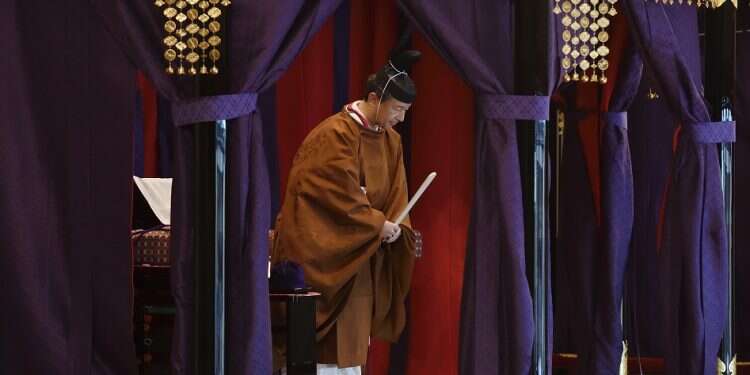Some 100 years ago, there were still emperors in Russia, Germany, China and Austro-Hungary. Even Gorge VI, the King of the United Kingdom, held the title of "Emperor of India" until 1947. Ethiopia had an emperor as well. But among the global powers, only Japan has managed to preserve this significant vestige of the old world – in a world which changing at dizzying speeds right before our eyes.
On Tuesday, Japan celebrated an event that occurs once every 200 years: the crowning of an emperor – while his predecessor is still alive. Just to make it clear: The previous emperor to resign was Emperor Kōkaku in 1817.
Follow Israel Hayom on Facebook and Twitter
Despite the extraordinary festivities, the surrounding décor remained true to traditional Japanese minimalism. Everything is meticulous, minimalist and aesthetic; and the people, it appears, were quite capable of waiting with bated breath even despite the lack of extravagance. Japanese television has been broadcasting images on a loop from the ceremony in which Prince Naruhito was first declared the new Japanese emperor, after his father, Emperor Akihito, abdicated on May 1, 2019.
The broadcasts have focused in part on images of the new emperor kneeling while speaking with the common folk. Now, after five months in the position, the 59-year-old Naruhito formally declared his ascension to the Chrysanthemum Throne as the nation's 126th emperor at the Imperial Palace in Tokyo on Tuesday.
An enthronement ceremony in Japan is a rare event, of course, usually held just once or twice every 100 years. Add to this the fact that Naruhito is the last emperor in the world and you can better understand what brought me back to Japan with such anticipation after 31 years.
Although the locals have sought to project an air of business as usual, Typhoon Hagibis, which recently pummelled the Land of the Rising Sun, did manage to disrupt the climactic moment of the celebrations. The new emperor and his wife, Empress Masako, were to hold a large parade through the streets of Tokyo immediately following the enthronement ceremony to allow the commoners to see with their own eyes God's representative on Earth (even if the institution of emperor came down to Earth a long time ago); but because of the massive damage caused by the typhoon, the parade was postponed until November 10. None of this, however, even slightly dampened the joy of the people here ahead of Tuesday's rare event.
Akihito, 85, was a beloved emperor but chose to abdicate on account of his advanced age and faltering health. His son pledged to "always think of the people, and while drawing close to them, fulfill my duties as a symbol of the Japanese state and the unity of the Japanese people in accordance with the constitution."
Japan is another planet, particularly when compared to the Middle East. While we are stuck with Bashar Assad, Hezbollah, Hamas, Gaza and Iran, a parallel, fascinating world is undergoing economic, cultural and societal upheaval. Up until the Second World War and Emperor Hirohito's declaration of surrender via radio, the citizens of Japan hadn't heard the voice of their emperor or seen him. Today, the emperor of Japan has a face and a voice. The new emperor and empress radiate an aura of humanity which draws the throne even closer to the image of man.
According to personal accounts, the emperor chats freely in English with foreign dignitaries, horses around with children and, if you can believe it, even plays with dogs. The 2019 emperor model: He does hold the loftiest title in the world, but in the words of Prof. Ben-Ami Shillony: "As far as his actual authority is concerned, he is the ruler with the least amount of power in the world."
In the large press room that had been prepared for the event, I'm sitting at a table with a bunch of journalists from Spain and Bahrain. Suddenly, I remember what they have in common – both countries have kings. There are journalists in the room whose expertise is royal families. For them, Japan is an upgrade.
"We have a lot of worries in Japan, but the emperor is a symbol and we want him to succeed, and are happy for him," I am told by Akiko, a young Japanese women who came to Tokyo from one of the city's suburbs. She studies accounting and works as a waitress.
183 nations have sent representatives to the enthronement. The ceremony, with its 2,500 invitees and 200 national representatives, is costing 16 billion yen (130 million euros.) Even Prime Minister Benjamin Netanyahu, who fostered personal ties with his Japanese counterpart Abe Shinzo, was supposed to attend, but the political impasse in Israel kept him at home. Palestinian Authority President Mahmoud Abbas, however, arrived in Tokyo and met with Abe. Israel will be represented by its veteran and well-respected ambassador to Japan, Yaffa Ben-Ari, who does excellent work in Tokyo. It's obvious that the success of the bilateral ties are due in a large part to her.
The current imperial era is known as "Reiwa" (beautiful harmony). The name of the imperial era is emblazoned on official documents and comprises an inseparable part of day-to-day life in Japan, and therefore holds great significance for the man in the street. It can be seen in hotels, on newspaper stands – basically everywhere. Israel will be looking east and watching the ceremony, wishing that the ancient society continue to write its future with the ink of the past, like it knows how to do so well. Perhaps we can learn something from them.




